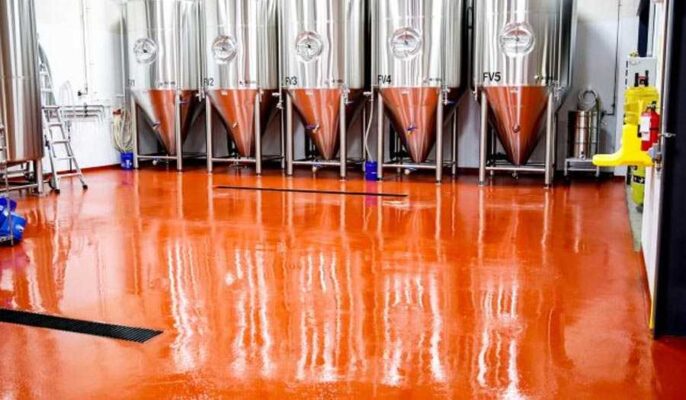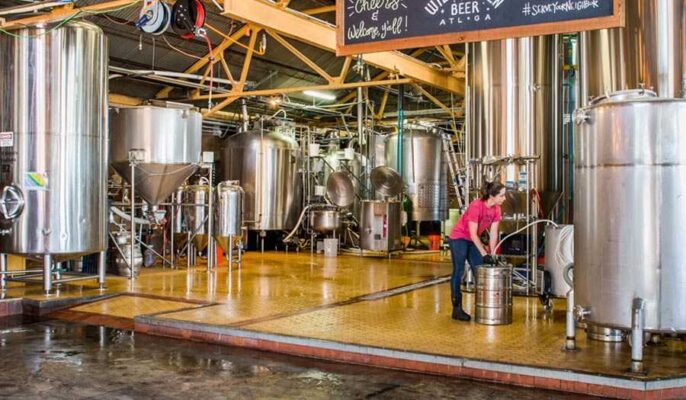If you are building or renovating a brewery, there are some special features of the flooring that can have a positive impact on your daily work. While flooring may not be the first concern, there are many advantages to installing the right brewery flooring to ensure your operation runs as as possible. In most industries, flooring and floor coatings are optional, even for aesthetic reasons, but this is not the case with brewery floors. As with all food and beverage related industries, breweries need to contend with a host of regulations if they are to remain in the market, many of which are related to the cleanliness of their production facilities.
Key Factors in Brewery Flooring Selection
Sanitary condition
Brewery floors must have no holes, cracks or gaps where bacteria can collect. Additionally, it is best to have anti-biotic properties to further prevent the growth of harmful organisms.
Moisture and chemical resistance
Many flooring types degrade when exposed to repeated moisture or corrosive chemicals. This, in turn, reduces their hygienic properties. Modern flooring options can prevent this from happening. You’ll want to make sure the flooring material can withstand these chemicals and add a chemical-resistant coating if needed. To prevent large-scale accidents, your floors and coatings need to be able to come into contact with any chemicals that may lead to prolonged exposure.

Wet/dry capability
The brewery will have areas that may remain wet, as well as other areas that must remain dry. Instead of having many flooring types, Black Bear’s premium flooring accomplishes both goals.
Anti-slip
From expensive machinery to everyday workers, brewery floors must be able to move with minimal sliding, even when wet. Preventing slips and falls will not only save you the cost of damaged products, but it will also prevent you from paying any legal fees if an employee slips or is injured on the floor. Slips and falls are the most common form of injury, costing breweries up to $16,000 a year in sick and paid time off.
Thermal shock resistance
During the brewing process, steam and boiling water can be used to produce the product, and cold water can be used to rinse the equipment. Brewery floors are exposed to a wide range of temperatures, from boiling hot water to liquids near freezing. This constant temperature change can damage regular flooring, and dangerous cracks and fissures can appear due to the constant contraction and expansion of the material.
The best way to prevent brewery floors from cracking is to apply a polyurethane coating. Because polyurethane expands and contracts at similar rates to concrete slabs, it allows for a natural cycle of expansion/contraction without cracking or delamination. The material is used to resist thermal shock, helping breweries around the world prevent cracks in their floors due to temperature changes.
low environmental impact
Going green is important to consumers, and breweries, especially small breweries, need to be able to prove their eco-friendliness to attract more conscious drinkers.
What are your options for brewery flooring?
There are some specific types of floor coatings breweries should consider using.

Some flooring types and materials breweries should consider include:
- Epoxy coating is a thick super glue type adhesive coating used to bond materials together. It is a popular choice because it is cost-effective, durable, and easy to install. But, epoxy flooring doesn’t last long, which means it must be redone when it starts to wear out.
- Polyurethane is another popular floor coating in the food and beverage industry as it meets all the requirements for flooring requirements. It is a high-quality, long-lasting option that is non-slip and hygienic. It also covers any cracks, ensuring bacteria cannot get trapped and grow.
- Methyl methacrylate is a popular brewery flooring choice because of its fast cure time. But, it still offers the same benefits as other flooring systems, such as the before mentioned polyurethane. The biggest difference between methyl methacrylate and the other options already mentioned is that methyl methacrylate comes in a variety of colors and additives like quartz crystals can be mixed with it for a more aesthetic appearance.
- Metallic epoxy is the same as regular epoxy. But, what sets it apart from regular epoxy is its appearance. Metallic epoxy has a unique look and texture that looks very much like glass, making it popular among breweries that attract large numbers of visitors. Additionally, metallic epoxy floors can be treated to make them more slip-resistant.
Brewery cleanup and proper drainage
As it’s important to have the right equipment and flooring systems in your brewery, it’s important to make sure everything is cleaned and sanitized. There are many different and effective methods, and the best ones vary depending on the brewery.
- Spot drains must sloping and extra effort to direct liquids to outlets in the floor. This type of drain is generally not suitable for breweries.
- Trench drain pipe is the most used drain pipe, but it is generally not suitable for use in breweries. Trench drains are covered by large fences, which can break down over time and lead to falls and injuries.
- Trough drains are the most popular drainage method for breweries. This type of drain pipe is thin and long and can span the entire length of the brewery. Due to the small size of this drain, no covering is required and it can be driven or walked on.





I know this website presents quality depending
posts and other material, is there any other web page which presents these
kinds of things in quality?